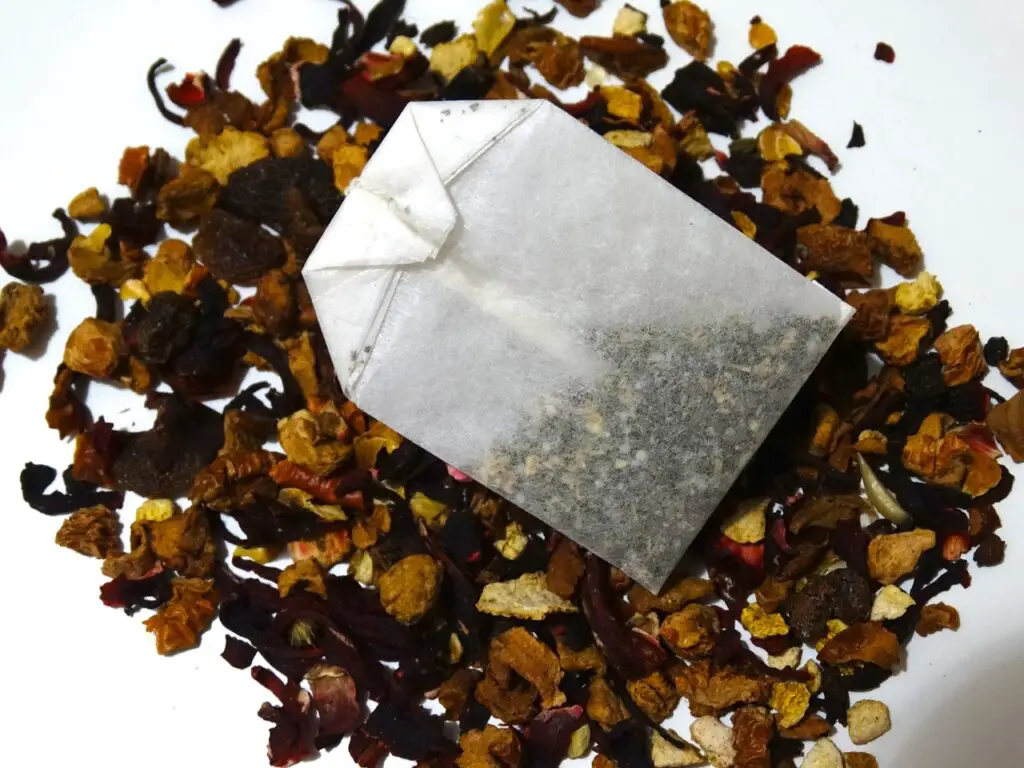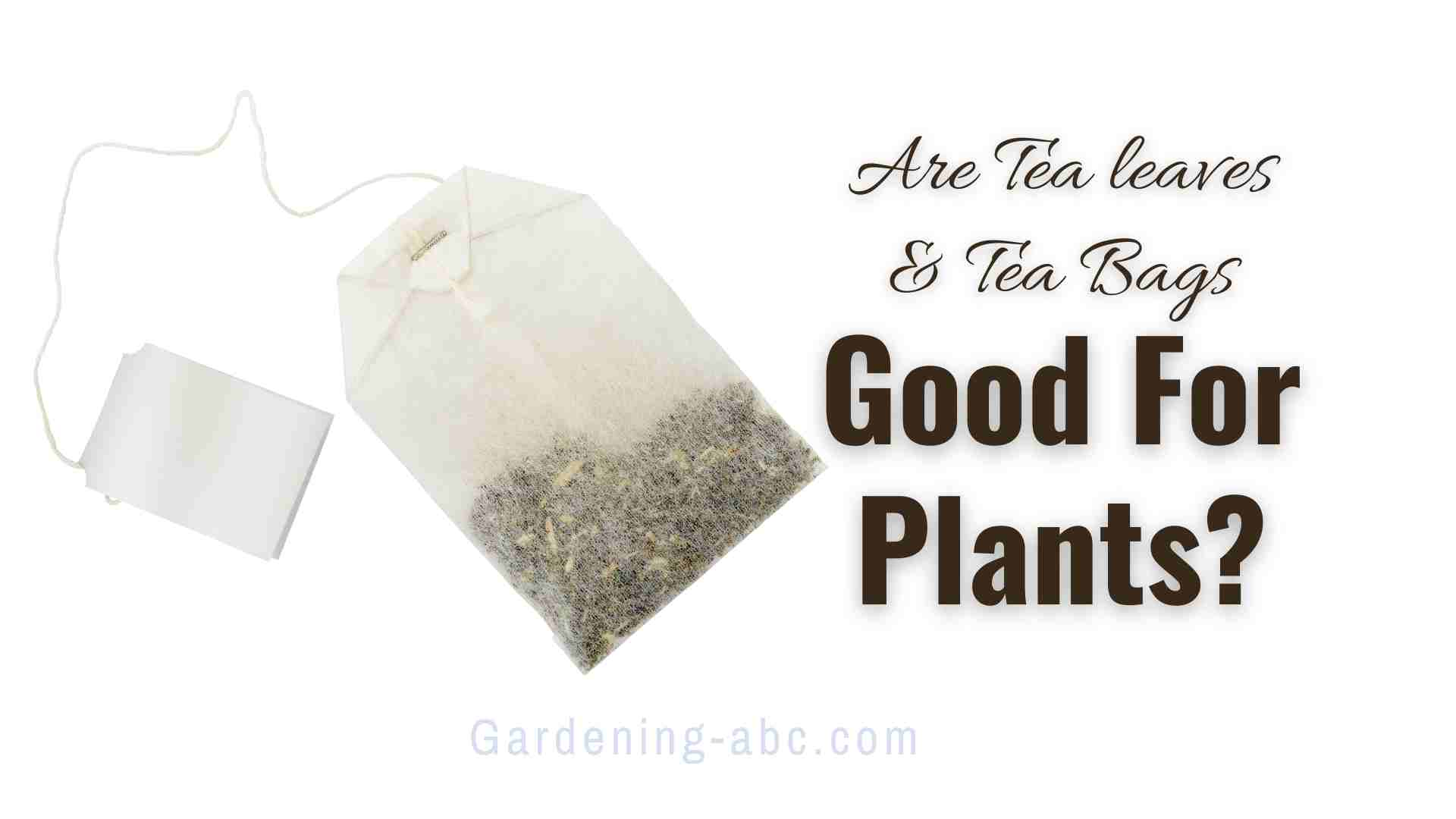We use affiliate links to run our site. When you buy through links on our site, we may earn an affiliate commission, without any added cost to you. Learn more
If you’re a tea lover, there is good news for you. Your leftover tea leaves and used tea bags can do more than just provide a tasty beverage – they can also help your plants grow!
That’s right, tea leaves and tea bags contain a range of nutrients that can benefit your garden. Not only that, but the organic matter found in tea leaves and tea bags can help to improve soil structure and drainage, making them an all-around useful addition to your garden.
So next time you finish a cup of tea, don’t throw those leaves or the bags away – use them to give your plants a boost!
In this article, we’ll delve into the benefits of using tea leaves and tea bags in the garden, and provide some tips on how to use them effectively to help your plants thrive.
Are Tea Leaves Good For The Plants?
Yes, tea leaves can be good for plants in certain circumstances. Tea leaves contain a range of nutrients, including nitrogen, potassium, magnesium, and iron, which can help to promote healthy plant growth. In addition, the organic matter found in tea leaves can help to improve soil structure and drainage.
However, it is important to use tea leaves in moderation, as excess nitrogen can lead to excessive foliage growth at the expense of flowers and fruit.
It is also important to use only organic, unflavored tea, as synthetic additives and flavorings can be harmful to plants.
Additionally, tea leaves should be used in combination with a balanced fertilization plan, as they do not provide all of the nutrients that plants need. In general, tea leaves can be a useful and natural addition to the garden when used in moderation and as part of a balanced fertilization plan.
Nutritional value of tea leaves and tea bags:
Tea leaves and tea bags contain a range of nutrients that can be beneficial for plants. One of the main nutrients found in tea leaves and tea bags is nitrogen, which is an essential element for plant growth.
Nitrogen is involved in the synthesis of proteins, enzymes, and other important plant molecules, and is particularly important for the development of new leaves and stems.
Tea leaves and tea bags also contain trace minerals such as potassium, magnesium, and iron, which are important for overall plant health and development.
Tea leaves and tea bags can also provide organic matter to the soil. When they break down, they release organic matter into the soil, which can help to improve soil structure and drainage.
This can be particularly beneficial for plants growing in pots or containers, which may have limited access to nutrients and water due to their small size.
So in general used tea leaves and tea bags can be a useful addition to the garden, providing a range of nutrients that can help to promote healthy plant growth and development. By improving soil structure and drainage, they can also help to ensure that your plants have the best possible conditions for growth.
Improving soil structure and drainage:
Tea leaves and tea bags can be helpful in improving the soil structure in the garden. When they break down, they release organic matter into the soil, which can help to improve soil structure and drainage.
This can be particularly beneficial for container plants, which have limited access to nutrients and water.
Improving soil structure and drainage can be important for the overall health of your plants. It allows excess water to drain away from the roots, preventing waterlogging and reducing the risk of root rot. Soil that is too compact or poorly draining can lead to poor plant growth.
Simply mix them into the soil around the base of your plants. You can also use brewed tea as a liquid fertilizer by pouring it directly onto the soil.
How to Use The Tea Leaves in Composting:
Tea leaves can be a useful addition to a compost pile, as they provide a range of nutrients and can help to improve the structure of the compost. To use tea leaves in composting, follow these steps:
- Allow the tea leaves to cool and dry before adding them to the compost pile.
- Mix the tea leaves into the compost pile, either by scattering them over the top or by adding them to the center of the pile.
- Make sure that the leaves are well-incorporated into the compost pile, as this will help them to break down more quickly.
- Keep the compost pile moist and well-aerated, as this will help to accelerate the decomposition process.
- Monitor the progress of the compost pile, and turn it regularly to ensure that all of the materials are decomposing evenly.
- When the compost is ready, it should be dark and crumbly, with a pleasant, earthy smell.
By following these steps, you can effectively use tea leaves in your composting efforts and create a rich and nourishing soil amendment for your garden.
How to Use Used Tea Bags in The Garden:

Used tea bags are good for your garden. If you are using tea bags to prepare tea, you can use those used tea bags as fertilizer and put them in the compost pile.
While dumping the tea bags, cut them open and take the tea leaves out.
Not all tea bags can decompose. In cases where the bags are made up of nylon, they will not help in composting.
Some tea bags can be made up of paper or silk they will decompose but the rate will be very different from the leaves. That is why it makes sense to take out the leaves from the bags.
Tips for using tea leaves and tea bags in the garden:
Here are some tips for using tea leaves and tea bags in the garden:
- Use only organic, unflavored tea. Synthetic additives and flavorings can be harmful to plants, so it’s important to use only natural, unflavored tea.
- Avoid using tea bags that contain synthetic additives or flavorings. These can be harmful to plants and should be avoided.
- Experiment with different types of tea. Different types of tea can provide different nutrients and benefits, so it’s worth trying out a few to see which works best for your plants.
- Use tea leaves and tea bags in moderation. While tea leaves and tea bags can provide a range of nutrients and improve soil structure and drainage, it’s important not to use too much, as excess nitrogen can lead to excessive foliage growth at the expense of flowers and fruit.
- Monitor the progress of your plants, and adjust your use of tea leaves and tea bags accordingly. Some plants may benefit more from tea leaves or brewed tea than others, so it’s important to pay attention to the needs of your specific plants.

Some key reminders:
Tea leaves can also be used as mulch. Unlike other kitchen scraps, they don’t need to be composted before applying as mulch.
The leaves can hold water in large quantities. So don’t apply them if your garden soil is damp and your plant requires dryer soil.
Tea leaves also protect the plant from many soil-borne diseases. It is a little acidic in nature so mixing with soil will decrease the pH of the soil, and provide an ideal growing condition for many plants.
Tea leaves are rich in potassium (K) and phosphorus (K) apart from Nitrogen (N), which are key elements in plant growth.
They are beneficial for growing Mushrooms in particular. Tea leaves mixed with peat moss works wonders for Mushrooms. Apart from Mushrooms tea leaves have also shown good results in rose cultivation.
Conclusion :
Tea leaves and tea bags are a simple and natural way to give your garden a boost! These inexpensive additions can provide a range of nutrients and improve soil structure and drainage, helping your plants grow strong and healthy.
Whether you’re using loose tea leaves or used tea bags, there are many ways to incorporate tea into your gardening routine. Just be sure to use only organic, unflavored tea, and avoid using tea bags that contain synthetic additives or flavorings, as these can be harmful to plants.
So next time you finish a cup of tea, don’t toss those leaves and bags in the trash – put them to good use in your garden!
With a little bit of experimentation, you can find the best ways to use tea leaves and tea bags to benefit your plants. And who knows – you may even discover a new favorite gardening trick! So go ahead, give the tea a try in your garden and watch your plants thrive.
I hope this post was helpful to you. Please feel free to share this information with others too.
Amazon and the Amazon logo are trademarks of Amazon.com, Inc, or its affiliates.

Hi there! My name is Prasenjit and I’m an avid gardener and someone who has grown a passion for growing plants. From my hands-on experience, I have learned what works and what doesn’t. Here I share everything I have learned.

Can one use tea leaves in which sugar is added ? i mean in normal Indian way of tea making we use sugar in the water is it safe to use such tea leaves?
There is no problem with added sugar.
Can one use tea leaves in which sugar and milk added ? i mean in normal Indian way of tea making we use sugar and milk is it safe to use such tea leaves?